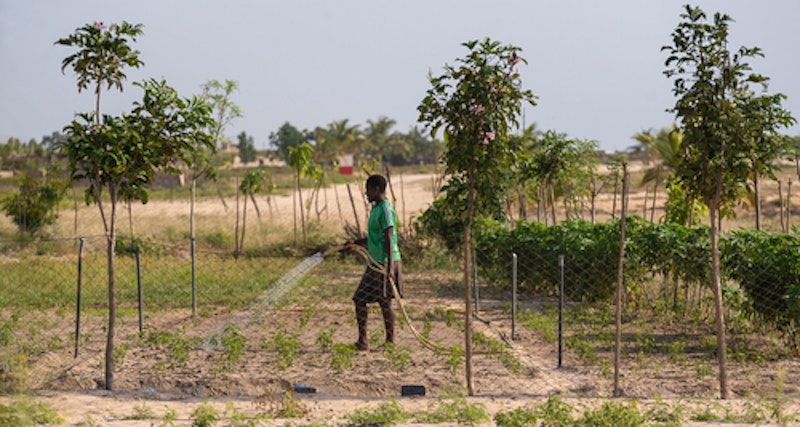Topic updates
Sustainable Cocoa Farming Yields Carbon Credits for Ghana

20th July 2023
This World Bank clip highlights how the REDD+ programme is helping Ghanaian cocoa farmers operate in a more sustainable manner, and in doing so generating carbon credits that will ensure that they are able to meet climate change targets and also participate in global carbon markets.

The REDD+ (Reducing Emissions from Deforestation and Forest Degradation) programme is a global initiative aimed at combating climate change by reducing greenhouse gas emissions through sustainable forest management in developing countries.
The programme offers significant potential for promoting sustainable growth in countries like Ghana. Here's how it can help:
- Forest Conservation and Emission Reduction: Ghana is endowed with valuable forests, but deforestation and forest degradation have been significant issues due to activities such as logging, agriculture expansion, and mining. REDD+ provides financial incentives for countries like Ghana to protect and conserve their forests. By reducing deforestation and forest degradation, Ghana can lower its carbon emissions and contribute to global climate change mitigation.
- Biodiversity Preservation: Forests are essential ecosystems that support rich biodiversity. The REDD+ programme encourages countries to adopt sustainable land-use practices, which can help protect endangered species and preserve ecosystems vital for the survival of numerous plant and animal species in Ghana.
- Community Empowerment: REDD+ emphasizes the involvement of local communities in forest conservation efforts. Implementing the programme can lead to increased community engagement, capacity-building, and empowerment. This inclusion allows communities to participate in decision-making processes, leading to more sustainable forest management practices that align with their needs and aspirations.
- Green Job Creation: REDD+ implementation requires various activities, such as forest monitoring, data analysis, community outreach, and sustainable forest management. These activities can generate employment opportunities, providing local communities with green jobs and income sources that are in harmony with nature.
- Sustainable Agriculture and Land Use: REDD+ encourages countries to shift towards sustainable agricultural practices, reducing pressure on forests for agricultural expansion. This shift can promote agroforestry, where trees are integrated into farming systems, thus enhancing soil fertility, crop yield, and overall ecosystem health.
- Carbon Market Opportunities: The REDD+ programme creates opportunities for countries like Ghana to participate in the global carbon market. By conserving forests and reducing emissions, Ghana can earn carbon credits that can be sold to developed countries seeking to offset their emissions. The revenue generated from such sales can be reinvested in sustainable development initiatives in Ghana.
- Climate Resilience: Healthy forests play a vital role in building climate resilience. By protecting forests, Ghana can enhance its ability to adapt to climate change impacts, such as extreme weather events and water resource management.
- International Cooperation and Funding: REDD+ is supported by international organizations, governments, and private sectors. Ghana can access financial and technical assistance through partnerships and collaborations with these stakeholders to implement sustainable growth initiatives effectively.
- Enhanced Governance and Monitoring: To participate in REDD+, countries like Ghana need to strengthen their governance and monitoring systems. This can lead to improved forest management practices, better law enforcement against illegal logging, and more transparent land-use planning.
Overall, the REDD+ programme provides a framework that incentivizes sustainable forest management, community involvement, and climate change mitigation. By integrating REDD+ into its development strategies, Ghana can foster sustainable growth, combat climate change, preserve biodiversity, and improve the well-being of its citizens.
You might also like

Economics of Falling Milk Prices
11th August 2015

Free economics lesson resources
19th July 2016

Cloud Fishing in Morocco
28th December 2016
Sunday evening TV and Victorian Economics
20th October 2017

Building Climate Resilience in Bangladesh
11th September 2022
Daily Email Updates
Subscribe to our daily digest and get the day’s content delivered fresh to your inbox every morning at 7am.
Signup for emails